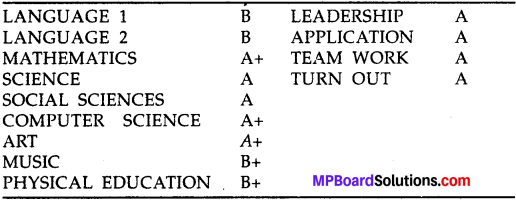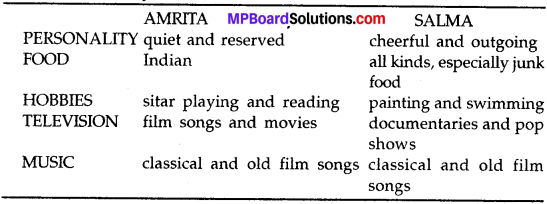Are you seeking for the Madhya Pradesh Board Solutions 10th English The Rainbow Workbook Special English Chapter 9 If Questions and Answers PDF? If yes, then read this entire page. Here, we are giving a direct link to download MP Board Class 10th English Solutions Questions and Answers PDF which contains the chapter wise questions, solutions, and grammar topics. You can also get the shortcuts to solve the grammar related questions on this page.
MP Board Class 10th English The Rainbow Workbook Solutions Chapter 9 If
For the sake of students we have gathered the complete 10th English The Rainbow Workbook Special English Chapter 9 If Questions and Answers can provided in pdf Pattern. Refer the chapter wise MP Board Class 10th English Solutions Questions and Answers Topics and start the preparation. You can estimate the importance of each chapter, find important English grammar concepts which are having more weightage. Concentrate on the important grammar topics from Madhya Pradesh Board Solutions for 10th English Chapter 9 If Questions and Answers PDF, prepare well for the exam.
If Vocabulary
I. A. Write five sentences beginning with ‘If’.
Answer:
- If it rains I won’t go to play.
- If I go to the market, I will purchase something for you.
- If it rains heavily, there will be flood.
- If children shout, the teacher will be angry.
- If I work hard, I will win definitely.
B. Write five sentences with If then
Answer:
- If you come to me then I will help you.
- If children study sincerely, then they will pass.
- If the teacher teaches well, then the students will follow.
- If my mother returns on time, then I will come to your place.
II. Complete the following sentences.
Answer:
- If you can keep the promise, I will be proud of you.
- If you can trust me, I will feel happy.
- If you can wait for me, I will be happy.
- If you can talk to me, I will help you.
- If you can meet me, I will tell you the entire story.
III. Differentiate between :
Question 1.
‘too good’ and ‘very good’.
Answer:
You are too good for me.
My friends are very good to all.
Question 2.
‘too wise’ and ‘very wise’.
Answer:
It is not too wise to interfere in other’s matter.
It will be very wise to give this test just now.
Question 3.
Knaves and fools.
Answer:
Knaves are never helpful.
Fools are often good at heart.
Listening Skill
Listen to this beautiful poem attentively.
See Workbook pages 71-72
I. Say the rhyming words from the poem like: hill-rill
Answer:
1. grass-bass
2. here-near
3. trail-fail
II. Match the coloums.
1. If you can’t be a pins – (a) then just be a pass
2. If you can’t be a bush – (b) be a star
3. If you can’t be a muskie – (c) on the top of the hilt
4. If you can’t be a highway – (d) be a bit of the grass
5. If you can’t be the sun – (e) then just be a trail.
Answer:
1. (C), 2. (6), 3. (e), 4. (a), 5. (b)
Speaking Skill
Organise a speaking session on the winter season in the class.
Every student has to speak one or two sentences. You may begin
with a phrase as given below.
Answer:
Do yourself.
See Workbook page 73
Reading Skill
Read the poem
See Workbook pages 73-74
A. Answer the following questions:
Question 1.
Make a list of things which are easily done.
Answer:
To criticise, to judge, to react, to stay stagnate, to escape from a situation, to confront.
Question 2.
Make a list of things which require efforts.
Answer:
To appreciate, to respond. to face a difficult situation, to laugh, to console, to take responsibility.
Question 3.
Make a list of qualities which make us a better person.
Answer:
To rely on inner strength, to trust someone, to console those who are in tragic situation.
Question 4.
Make a list of qualities which don’t help us in being a better person.
Answer:
To stay stagnate, to be caught in wordly activities, to complaints all the time.
B. (a) Give the synonyms of the following:
Answer:
appreciate – praise
confront – face
console – pacify
strength – boldness
(b) Search for the words and phrases which enhance the quality of life.
Answer:
To take risk, to listen patiently, to laugh, to relax, to rely on inner strength, to praise someone on his success.
(c) Search for the words and phrases which will not help us in leading a qualitative life.
Answer:
To be discouraged by others, to be fearful and worried, to get caught in wordly activities.
Writing Skill
Question 1.
Write a letter of advice to your younger brother to set a goal in life and try to achieve it, as he is planning his career. (50 words)
Answer:
16, Shivaji Park
Gwalior
Dear Raghu
I am highly shocked to know that you are not doing very well in your studies. It is not a good sign. Life is precious. Time fleets fast. So fix your goal and do accordingly. Without it you can’t achieve something good. If you face any problem consult your teachers. Be particular about your time and effort. I hope you will mind it and mend your ways. Hoping for your reply.
Yours
Manoj
Question 2.
Narrate some memorable teachings and inspirational pieces of advice given by your parents. (150 words)
Answer:
Parents are our first teachers. Usually we don’t heed them. But it is not a good sign. If we heed them properly we won’t fail in any of our efforts. Once, I still remember, my parents gave me some tips for a safe journey. I did accordingly and I was really very glad that it saved me from a lot of problems. Once when I was going on a tour alone, my parents told me not to be cowed down by anyone if I am right and true. They also told me to help the needy and respect the elders.
Hope that the above shaped information regarding the Madhya Pradesh Board Solutions for 10th English Chapter 9 If Questions and Answers is useful for making your preparation effective. View our website regularly to get other subjects solutions.


